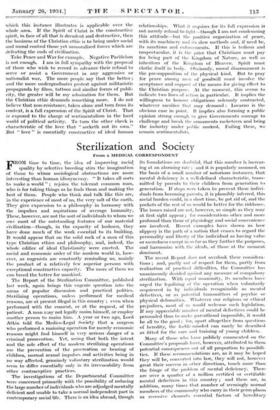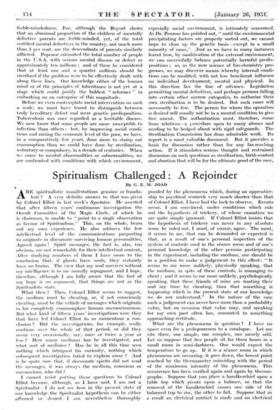Sterilization and Society
From a MEDICAL CORRESPONDENT
FROM time to time, the idea of improving racial quality by selective breeding stirs the imagination of those to whbm sociological abstractions are more interesting than human idiosyncrasy. " It takes all sorts to make a world " ; rejoins the tolerant common man, who is for taking things as he finds them and making the best of them: People who think gnd talk like this are, in the experience of most of us, the very salt of the earth. They give expression to a philosophy in harmony with the :impulses and aspirations of average humanity. These, however, are not the sort of individuals to whom we owe most of the outstanding features of our material civilization—though, in the capacity of hodmen, they have done much of the work essential to its building. It would appear that on the solid rock of a man of this type Christian ethics and philosophy, and, indeed, the whole edifice of ideal. Christianity were erected. The social and economic order of the modern world is, how- ever, as eugenists are constantly reminding us, mainly the product -of -a relatively few superior persons with exceptional constructive capacity. The more of them we can breed the better for mankind.
• The Report of the Sterlization Committee, published last week, again brings this eugenic question into the arena of popular discussion and practical polities. Sterilizing operations, unless performed for medical reasons, are at present illegal in this country ; even when performed with the -consent, or at the request, of the patient; A man may not legally maim himself, or employ another person to maim him. A year or two ago, Lord Atkin • told the Medico-Legal Society that a surgeon who performed a maiming operation for merely economic reasons might find himself in very serious -danger of a criminal prosecution. Yet, seeing that- both the intent and the sole effect 'of the modern sterilizing operations are the prevention of the procreation -Or - bearing of children, 'normal _sexual impulses and activities being in no way affected,- genuinely voluntary sterilization would seem to differ essentially only in its irrevocability from other contraceptive practices.
The investigations • of the. Departmental Committee 'Were' concerned primarily with the possibility of reducing the large number-of-individuals who are adjudged mentally deffeient and unable to take a normal independent part in contemporary social-life. There 'is an idea abroad, though its foundations are doubtful, that this number is increas- ing at an alarming rate ; and it is popularly assumed, on the basis of a small number of notorious instances, that mental deficiency is a well-defined characteristic, trans- mitted by parents to their children from generation to generation. If steps were taken to prevent -these indivi- duals from becoming parents, it is plausibly inferred, this social burden could, in a short time, be got rid of, and the pockets of the rest of us would be better for the riddance. The issues raised arc not, however, so simple as they may at first sight appear ; for considerations other and more profound than those of physiology and social convenience are involved. Recent examples have shown us how slippery is the path of a nation that ceases to regard the personality and liberty of the individual as having value or sacredness except in so far as they further the purposes, and harmonize with the ideals, of those at the moment dominant.
- The recent Report does not overlook these considera- tions ; and, partly out of respect for them, partly from realization of practical difficulties, the Committee has unanimously decided against any measure of compulsory sterilization. With equal unanimity, its members have urged the legalizing of the operation when voluntarily acquiesced in by individuals recognizable as mental defectives, or as potential transmitters of psychic or physical deformities. Whatever our religious or ethical prejudices, most of us would welcome such legislation. If any appreciable number of mental defectives could be persuaded thus to make parenthood impossible, it would be all to the good ; for, apart altogether 'from questions of heredity, the feeble-minded can rarely be described as fitted for the care and training of young children.
Many of those who have publicly commented on the Committee's proposals have, however, attributed to them potential Consequences out of all proportion to possibili- ties. If these recommendations are, as it may be hoped they will be, converted into law, they will not, however great their success in other directions, touch more than the fringe of the problem of mental deficiency. There are over a quarter of a million certified or certifiable mental defectives in this country ; and there are, in Addition, -many times that number of seemingly normal members of the community who carry in their germ-plasm as recessive elements essential factors of hereditary feeble-mindedness. For, although the Report shoEvs that an abnormal proportion 'of the'children of -Mentally defective parents are feeble-Minded, yet, of the total certified mental defectives in thecountry, not much more than 5 per cent. are the descendants of parents similarly rifflieted. Popenoe estimated the total number of people in the U.S.A. with serious mental disease or defect as approxiMately ten millions ; and of -these he considered that at least one and • a quarter millions should be- sterilized if the problem Were to be effectively dealt with along these lines. Our knowledge either of the human mind or of the principles of inheritance is not yet at a stage which could justify the boldest ". reformer " in embarking on an enterprise of this magnitude.
Before we even contemplate racial intervention on such a scale, we must have learnt to distinguish between truly hereditary defect and mere genetic predisposition. Tuberculosis was once regarded as a heritable disease. We now know that some people arc more susceptible to infection than others : but, by improving social condi: tions and raising the economic level of the poOr, we have,. in a comparatively few years, done more to stamp out consumption than we could have done by sterilization, voluntary or compulsory, in a decade of centuries. When we come to mental abnonnalitiei or subnormalities, we are confronted with conditions with which environment, especially social environment, is intimately • cOncerned.r. As Dr. Penrose has pointed Out, " until the envirdninerita.- I precipitating factors are properly sorted out We cannot hope to clear up the genetic basis—except in a small, minority of eases." Just- as we have in 'many :instances- learnt how, by modification of the external eniironment,- We can successfully balance potentially harmful- predis- positions ; so, as the new , science of- bio-chemistry pro- gresses, we may discover means whereb-y internal eortdi.e tions can be modified; with not Iess 'beneficent influence On individual development; -mental and physical. In this direction lies the line of advance. Legislation permitting mental defectives, and perhaps persons falling into certain other narrow categories, to authorize their, own sterilization- is to be desired. But suck. cases will necessarily- be few. The person for whom- the- operation is desired will usually not be in a mental condition to give- free assent. The authorization must,• therefore, come froth relatives—a procedure open. to many - abuses and needing to be hedged about With rigid safeguards. The Sterilization Commission .has done admirable work. Its report is a most ;valuable. document. But it provides a basis for discussion rather than for any far-reaching action. If it stimulates serious thought and restrained discussion on such questions as sterilization, birth-control and abortion that will be for the ultimate good of the race,











































 Previous page
Previous page